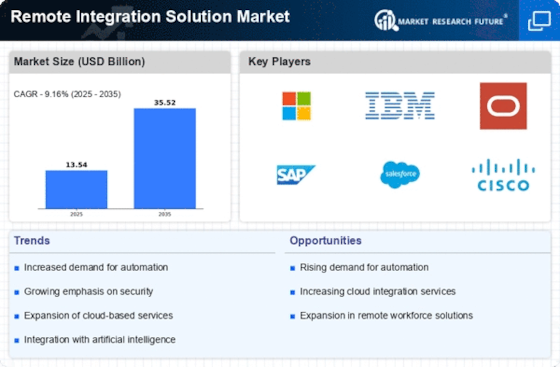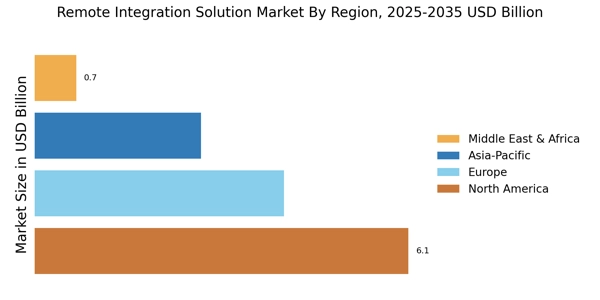Integration of IoT Devices
The proliferation of Internet of Things (IoT) devices is significantly influencing the Remote Integration Solution Market. As more devices become interconnected, the need for effective integration solutions becomes paramount. The market for IoT devices is projected to reach over 75 billion units by 2025, necessitating robust integration frameworks to manage data flow and connectivity. This trend indicates a growing reliance on remote integration solutions to ensure that diverse IoT systems can communicate effectively, thereby enhancing operational efficiency and driving market growth.
Growing Need for Real-Time Data Access
The demand for real-time data access is a critical driver in the Remote Integration Solution Market. Businesses are increasingly relying on timely data to make informed decisions and respond swiftly to market changes. The integration of real-time data analytics into remote solutions is becoming essential for organizations aiming to maintain a competitive edge. Research indicates that companies utilizing real-time data integration can improve operational efficiency by up to 30%. This growing need for immediate access to data is likely to stimulate further investment in remote integration solutions, thereby enhancing market dynamics.
Emphasis on Data Security and Compliance
In the Remote Integration Solution Market, there is an increasing emphasis on data security and compliance. Organizations are becoming more aware of the risks associated with data breaches and regulatory requirements. As a result, many are prioritizing integration solutions that offer enhanced security features. Recent statistics suggest that nearly 60% of businesses are investing in secure integration solutions to protect sensitive data. This focus on security is likely to propel the demand for remote integration solutions that can ensure compliance with various regulations, thereby fostering growth in the market.
Rising Adoption of Remote Work Solutions
The Remote Integration Solution Market is experiencing a notable surge in demand due to the increasing adoption of remote work solutions. Organizations are increasingly recognizing the need for seamless integration of various applications and systems to facilitate remote collaboration. According to recent data, approximately 70% of companies are investing in remote integration solutions to enhance productivity and streamline workflows. This trend is likely to continue as businesses seek to optimize their operations in a remote environment, thereby driving growth in the Remote Integration Solution Market.
Advancements in Artificial Intelligence and Automation
The Remote Integration Solution Market is being propelled by advancements in artificial intelligence (AI) and automation technologies. These innovations are enabling organizations to automate integration processes, thereby reducing manual effort and minimizing errors. The market for AI-driven integration solutions is expected to grow significantly, with projections indicating a compound annual growth rate of over 25% in the coming years. This trend suggests that businesses are increasingly adopting AI and automation to enhance their integration capabilities, which is likely to drive substantial growth in the Remote Integration Solution Market.

















